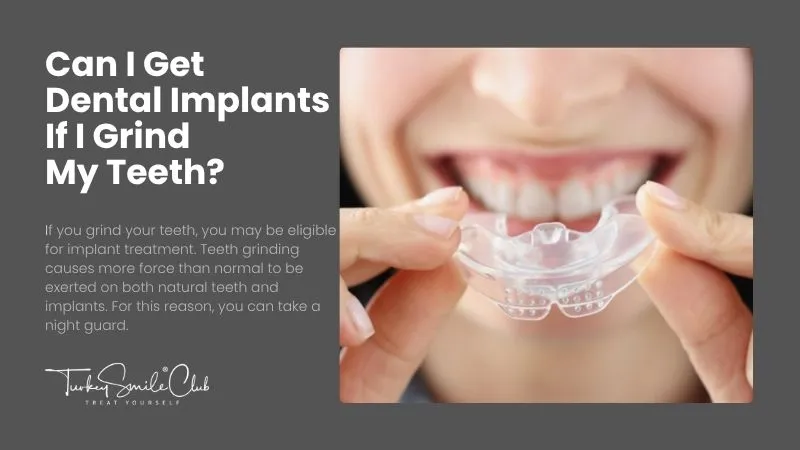
Can I Get Dental Implants If I Grind My Teeth?
Can I Get Dental Implants If I Grind My Teeth?
If you grind your teeth, you may be eligible for implant treatment. Teeth grinding causes more force than normal to be exerted on both natural teeth and implants. While the force applied during normal chewing is around 200–300 newtons, this figure can rise to 700–800 newtons in people who clench their teeth. Such high pressure can damage the implant bridge and screw.
Modern implant systems used today stand out for their pressure resistance. In addition, patients can use their implants for longer when they wear a night guard. The best approach in this regard is to control the teeth grinding problem if possible.
Can teeth grinding be cured completely before implant treatment?
Bruxism can be controlled. First, the cause of teeth grinding must be determined. Stress, sleep disorders, malocclusion or neurological factors may cause this habit. Dentists resolve the problem of bruxism caused by malocclusion before implant treatment or plan the occlusion accordingly. Botox injections prevent the contraction of the muscles causing teeth grinding, or a night guard is recommended to protect the implants.
With these measures, the negative effects of teeth grinding are greatly reduced, allowing dental implant treatment to be performed safely.
How does teeth grinding affect dental implants?
Bruxism places additional stress on implants, which is particularly critical during the healing period. The excessive force exerted by the jaw muscles during teeth grinding can delay osseointegration, disrupt bone healing by causing micro-movements in the implant, lead to loosening of the implant screw or fractures in the prosthetic components, and cause damage to porcelain veneer.
Can dental implants fail because of teeth grinding?
Teeth grinding can negatively affect the success of implants, particularly in the early stages. However, this risk is minimised by taking appropriate precautions. Prolonged and intense pressure applied to the implant causes microtrauma to the bone surrounding the implant. This leads to bone loss (resorption). If bone loss progresses, implant failure occurs.
How do dentists diagnose bruxism before implant surgery?
The diagnosis of teeth grinding cannot be made solely by looking at the appearance of the patient’s teeth; a detailed assessment is required. Symptoms such as jaw pain, headaches, or discomfort around the ears upon waking in the morning can aid in diagnosis.
Other signs of teeth grinding are understood as follows: examination of wear and cracks in the teeth, checking the jaw muscles, and measuring chewing force with digital occlusion analysis. The dentist makes a diagnosis by evaluating all of these.
What are the best implant materials for patients with bruxism?
When selecting implant materials for patients who grind their teeth, the most important criterion is the balance between durability and flexibility. Titanium implants absorb chewing forces well thanks to their flexible structure and durability. Monolithic zirconia or metal-supported porcelain can be preferred for dental bridges or crowns. In some cases, a composite cushion layer is added under the crown to increase its shock-absorbing effect. Your dentist is the best person to advise you on this matter. After conducting the necessary examinations, they will recommend the most suitable treatment plan and implant material for you.
In addition, the contact points of the implant prosthesis are carefully adjusted to ensure that chewing forces are distributed evenly. This ensures that both the implant and the surrounding bone remain healthy for many years.
What should I avoid after getting implants if I grind my teeth?
The healing process following implant placement is delicate. This is because implant has not yet fully integrated with the bone during this period.
Things patients should avoid during this process:
- Avoid hard foods. Foods such as nuts, walnuts, ice, and dry bread crusts put excessive strain on the implant area.
- Wear your night guard regularly. Even short-term micro-loosening can put your implant at risk.
- Calm down before going to bed. Taking a warm shower, doing breathing exercises or listening to relaxing music relaxes the jaw muscles and helps reduce teeth grinding while you sleep.
- Limit your caffeine and alcohol consumption. These substances can increase muscle spasms during sleep.
Do not neglect regular dental check-ups. Especially during the first year, have the condition of the bone around the implant checked frequently to ensure that your implant is secure.
With the necessary precautions, Antalya dental implants remain strong, aesthetic, and functional for many years, even in patients with teeth grinding habits. With an appropriate treatment plan, the right choice of materials, and regular check-ups, bruxism does not hinder implant success.